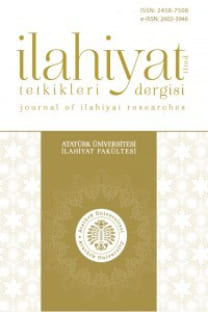Arap Dilinde Tenâzu‘
Bu makale, “Tenâzu‘” konusunun Arap Dili’ndeki yerini, dilbilimcilerin konuyu ele alış şeklini,ilk kaynaklarda işlenişini, tartışma konusu olan yönlerini ve “Tenâzu‘” konusunun anlama bakanyönünü açıklamaktadır.Tenâzu‘, önce gelen iki veya daha fazla âmilin sonra gelen bir veya daha fazla açık (görünen)mamûlde amel etme durumudur.Çalışmamız önce gelen âmillerden hangisinin sonra gelen mamûlde amel etme önceliğini incelemiştir.Tenâzu‘da iki rükün vardır, biri en az iki fiil veya fiilimsiden oluşan âmiller, diğer rükünde,açık gelen isimdir. örnekte görüldüğü gibi fiil cümlesinin her iki yüklemi olanve fiilleri (yüklemleri), özne veya nesne konumunda olan kelimesinde amel etmek istemektedirler.Basralı dilcilere göre ikinci fiil olan nun amel etme önceliği olduğundan kelimesi,ikinci fiilin nesnesidir. Kûfeli dilcilere göre amel etme önceliği birinci fiile ait olduğundan kelimesi,birinci fiilin öznesi hükmündedir. Her iki durumda da cümlenin anlamı değişmemektedir.Bu konu, gramer kitaplarında çok fazla tartışılmıştır. Burada konunun tartışmalı yönleri tahliledilmiş ve okuyucuya konu bir bütün olarak sunulmaya çalışılmıştır.
Al-Tanāzu‘ in The Arabic Language
This article has been prepared to show the place of the tenāzu subject in the Arab language, theway of the linguists handle the subject, it’s processing from the first sources, the sides subject to thecriticism and the part of the “tenāzu” subject concerning the meaning.“Tenāzu” is the situation in which two or more preceding verbs/verbals act in getting possessionof the communal element or elements (al-mutanâza‘fih) itself.Our study have examined which preceding werbs/werbals take priority in acting in gettingpossession of the communal element or elements (al-mutanâza‘fih) itself/themselves.There are two elements in the tanāzu‘. The first is an active element consisting of twoverbs/verbals, and the second is visible noun. As is seen in the following example thereare two verbs in this sentence, and both of them want to be active in zeyd being a subject or anobject position in the sentence. According to Basrian linguists zeyd is an object of the secondverb because the second verb has priority in active element. however according to Kufan linguistszeyd is an subject of the first verb because the first verb has priority in active element. There isn’tany different meaning in both situations.This subject has been discussed much in the gramer books. In this study, the problematic sides ofthe subject has been analyzed and tried to submit to the reader as a whole.
___
- Arap Dilinde Tenâzu‘
- ISSN: 2458-7508
- Yayın Aralığı: 2
- Başlangıç: 1975
- Yayıncı: Atatürk Üniversitesi
